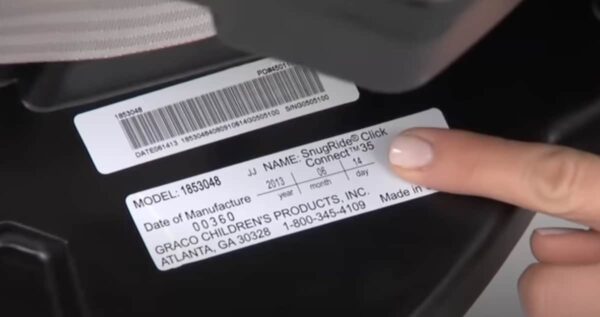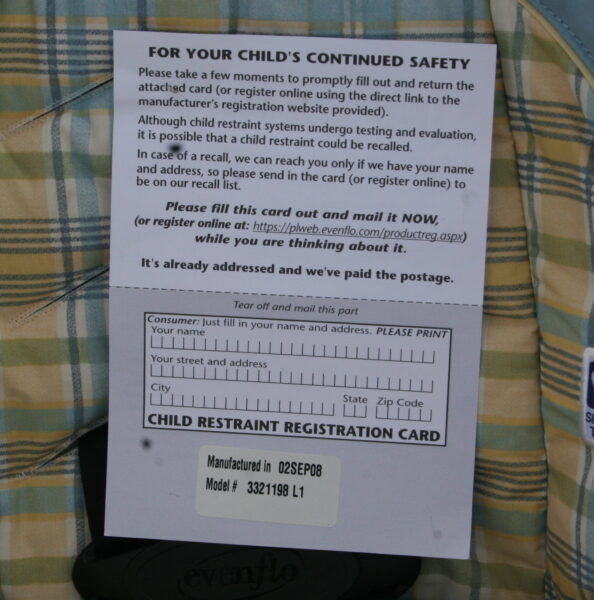Did you know that there is such a thing as a car seat expiration date? Neither did I. It was only when writing about the annual Target car seat trade-in event that I learned of such a thing.
It surely wasn’t anything I thought about when my daughters were younger and riding in car seats. Since they were born just under two years apart, we simply passed down one car seat to the other. The only time we had to buy a new car seat was when both were big enough to be in booster seats at the same time. But, again, I never would have looked to see what the car seat expiration date was on the box or the seat itself.

Why car seat expiration dates matter
Car seat expiration dates matter because the materials used in car seats can degrade over time. This can potentially compromise the seat’s structural integrity and safety performance.
For example, the plastic they use to make a car seat can become brittle over time. Or, other components can wear down over time, making the seat less effective in protecting a child in the event of a crash. If you have a family with multiple children and you’re handing them down to each, you don’t want your youngest to be in the most unsafe seat.
Most car seats expire six to 10 years after the company makes them. However, later in this article I explain that certain manufacturers state a specific number of years after manufacture as the expiration date. For example, Graco tells customers it is seven years later.
Can a car seat expire sooner?
Absolutely, your car seat could expire sooner, whether the sticker says so or not. For example, extreme temperatures can make that happen sooner. This is both extreme cold and extreme hot. So, if you don’t park your car in a temperature-controlled garage, those car seats can become unsafe sooner.
Also, if your car is in a moderate to severe crash, you should stop using the car seat immediately. You may not see any damage to the car seat, but trust me: the force from a crash, even a moderate one, can impact the structural integrity and safety of the car seat.
Or a car seat might be recalled. That means you need a new one.
Car seat recalls
A child’s car seat may be recalled due to various reasons. Some of these might include:
- safety-related defects
- poor functionality
- defective harnesses
- faulty buckles
- structural weaknesses
- other safety concerns that could compromise the protection a car seat provides
You can use this page on the National Highway Traffic Safety Administration website to look for car seat recalls. This page also includes recalls concerning cars, tires and other vehicular equipment.
Car seats and rental cars
One time I flew to Maine to visit my mother with my two young daughters in tow. We parked the car at the airport, I loaded the girls into their double stroller and off we went. It was only when we boarded the plane that I realized I had forgotten their car seats in the car.
We had planned to rent a car at Portland Jetport when we landed. Thankfully, the car rental also had car seats available. However, what about expiration dates? Or car seats that might have been in a crash in a rental car or been recalled? How are you, as a parent or grandparent, even supposed to know the car seat’s history? At the very least, if you must rent a car seat, I would strongly suggest you check the seat’s expiration date.
Where do you find the expiration date on a car seat?
The car seat expiration date is typically printed on a sticker or molded into the plastic of the car seat. This information is commonly located on the back or bottom of the seat. It’s important to check this date to ensure that the car seat is still safe and effective for use.
Also, unlike food expiration dates or best by dates, a car seat’s expiration date is often presented backwards, if you will. That is, you may see the date as the date of manufacture.
Graco says that a car seat expires seven years after it manufactures one. So you would add seven to the date on the sticker to figure out the expiration date.
Another place you might see this information is on the car seat registration card. When you buy a new car seat, you should register it with the manufacturer. That way, if there is ever a recall, they have your information and how to contact you, much like when cars have a recall. The automotive safety program at Indiana University offers a great explanation of how this works.

Free and Cheap Things To Do in Southern Maine This Week
Here are FREE and cheap things to do in Southern Maine in the coming week.